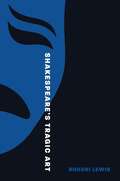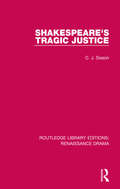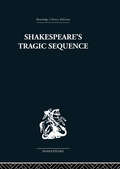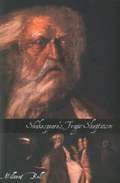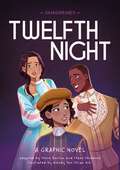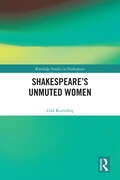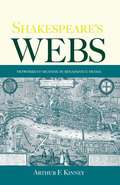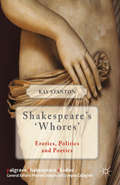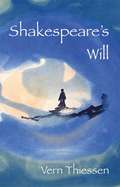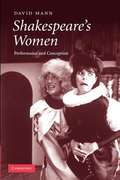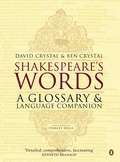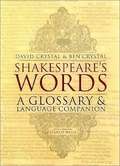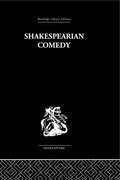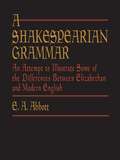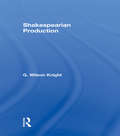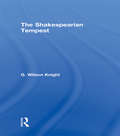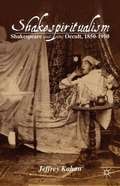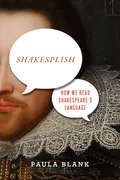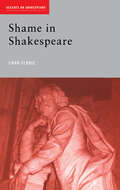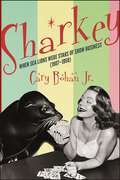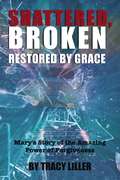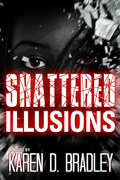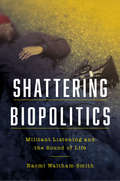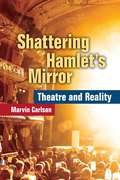- Table View
- List View
Shakespeare’s Tragic Art
by Rhodri LewisA new account of Shakespearean tragedy as a response to life in an uncertain worldIn Shakespeare&’s Tragic Art, Rhodri Lewis offers a powerfully original reassessment of tragedy as Shakespeare wrote it—of what drew him toward tragic drama, what makes his tragedies distinctive, and why they matter.After reconstructing tragic theory and practice as Shakespeare and his contemporaries knew them, Lewis considers in detail each of Shakespeare&’s tragedies from Titus Andronicus to Coriolanus. He argues that these plays are a series of experiments whose greatness lies in their author&’s nerve-straining determination to represent the experience of living in a world that eludes rational analysis. They explore not just our inability to know ourselves as we would like to, but the compensatory and generally unacknowledged fictions to which we bind ourselves in our hunger for meaning—from the political, philosophical, social, and religious to the racial, sexual, personal, and familial. Lewis&’s Shakespeare not only creates tragedies that exceed those written before them. Through his art, he also affirms and invigorates the kinds of knowing that are available to intelligent animals like us.A major reevaluation of Shakespeare&’s tragedies, Shakespeare&’s Tragic Art is essential reading for anyone interested in Shakespeare, tragedy, or the capacity of literature to help us navigate the perplexities of the human condition.
Shakespeare's Tragic Justice (Routledge Library Editions: Renaissance Drama)
by C. J. SissonThe problem of justice seems to have haunted Shakespeare as it haunted Renaissance Christendom. In this book, first published in 1963, four aspects of the problems of justice in action in Shakespeare’s great tragedies are explored. This study is based on the lifetime’s research of Elizabethan habits of mind by one of the most distinguished Shakespearean scholars, and will be of interest to students of English Literature, Drama and Performance.
Shakespeare's Tragic Sequence
by Kenneth MuirFirst published in 1972. The emphasis of this book is that each of Shakespeare's tragedies demanded its own individual form and that although certain themes run through most of the tragedies, nearly all critics refrain from the attempt to apply external rules to them. The plays are almost always concerned with one person; they end with the death of the hero; the suffering and calamity that befall him are exceptional; and the tragedies include the medieval idea of the reversal of fortune.
Shakespeare's Tragic Skepticism
by Millicent BellShakespeare's Tragic Skepticism has an ambitious aim. In writing it, I have tried to mark out a pathway across a trampled field, discussing plays more commented on over four centuries than anything else ever written except the Hebraic-Christian Bible.
Shakespeare's Twelfth Night: A Graphic Novel (Classics in Graphics #7)
by Steve Barlow Steve SkidmoreShakespeare's Twelfth Night like you've never seen it - or read it - before! Classics in Graphics: Twelfth Night has been adapted into a graphic novel by expert authors, Steve Skidmore and Steve Barlow, with illustrations by Wendy Tan Shiau Wei. Experience the famous (and famously confusing) love triangle, presented with all the flair of your favourite rom-com.Classics in Graphics is a series of graphic novels for readers aged 10 plus that has inclusion at its heart, flinging wide the doors of literature for all to enter and understand. Including dyslexia-friendly design and encouraging readers to relate to iconic roles - casting spells, falling in love and winning duels. Each graphic novel includes pitch-perfect illustrations for depicting tragedy, romance, comedy or magic PLUS: - snappy simplified text presenting Shakespeare's themes clearly - introductory materials to help set the scene and context of each story - heaps of extra material at the back to keep the learning and fun going, including an exploration of themes in the play, the language, Shakespeare's inspirations, the publication and performance of the play in history, a timeline of Shakespeare's life and works, and much more! Plays available in the series include: Macbeth, The Tempest, Hamlet, Romeo and Juliet, A Midsummer Night's Dream, Much Ado About Nothing, Othello, Twelfth NightPraise for Classics in Graphics: "[...] an encouraging entry point to Shakespeare for my kids, and [...] an excellent job converting challenging language and literary themes to make it very inclusive, smoothing ease of understanding dialogue, plot, and narration without dumbing it down." - EricWilliamson, leagueofcomicgeeks.com
Shakespeare's Understanding of Honor (Studies in Statesmanship)
by John AlvisShakespeare's Understanding of Honor by John Alvis.
Shakespeare’s Unmuted Women (Routledge Studies in Shakespeare)
by Gül KurtuluşShakespeare’s Unmuted Women explores women’s speeches in selected plays by Shakespeare, highlighting women’s discerning insight as a vital ingredient in these selected works. The book discusses the use of rhetoric in speeches by women as a cementing material that supports the casing of the incidents. Women holding forth on the issues related to the common concerns emerged in the plays perform a distinguishing role in strengthening the bond between decisions taken and executed by each character and make their major important contribution to the overall impact of the play. Comprising six chapters, the volume analyses Cordelia’s and Desdemona’s speeches in King Lear and Othello; Cleopatra’s and Tamora’s speeches in Antony and Cleopatra and Titus Andronicus; Beatrice’s and Rosalind’s speeches in Much Ado About Nothing and As You Like It; and Katherine’s and Lady Anne’s speeches in Henry V and Richard III, respectively. The text discusses women’s rich and profound discourse in these works to accentuate the meaningful input in verbal communication. In Shakespeare’s selected plays, women’s insightfulness and perspicuity are closely considered to emphasize how women make efficient use of rhetoric, aptly used by Queen Elizabeth I during Shakespeare’s time. Queen Elizabeth’s outstanding public speeches inspired those who listened to her and Shakespeare’s women are partial embodiments of her.
Shakespeare's Webs: Networks of Meaning in Renaissance Drama
by Arthur F. KinneyIn this book, renowned Renaissance drama critic Arthur F. Kinney argues that Shakespeare's method of composing plays through networks of meanings can be seen as a harbinger of today's information technology. Drawing upon hypertext and cognitive theory--areas that have for some time promised to take on more importance in the sphere of Shakespeare Studies--as well as the central metaphor of the Routledge collection The Renaissance Computer, Kinney looks in detail at four objects/images in Shakespeare's plays--mirrors, maps, clocks, and books--and explores the ways in which they make up networks of meaning within single plays and across the dramatist's body of work that anticipate in some ways the networks of meaning or "information" now possible in the computer age.
Shakespeare’s ‘Whores’
by Kay StantonShakespeare's 'Whores' studies each use of the word 'whore' in Shakespeare's canon, focusing especially on the positive personal and social effects of female sexuality, as represented in several major female characters, from the goddess Venus, to the queen Cleopatra, to the cross-dressing Rosalind, and many others.
Shakespeare's Will
by Vern ThiessenAn exploration of one of the most silent characters in history: Anne Hathaway, the wife of William Shakespeare. The play sheds light on unexplored aspects of Hathaway's life by looking through the eyes and heart of the woman who spent a lifetime with—and without—the great poet. This work is the celebration of a life unbowed by tragedy and unapologetic in the face of public scorn.
Shakespeare's Women: Performance and Conception
by David MannDavid Mann examines the influence of the Elizabethan cross-dressed tradition on the performance and conception of Shakespeare's female roles through an analysis of all 205 extant plays written for the adult theater. The study provides both an historical context, showing how performance practice developed in the era before Shakespeare, and a comparative one, in revealing how dramatists in general treated their female characters and the influence their characterization had upon Shakespeare's writing. The book challenges many views of the sexual ethos of Elizabethan theater, offering instead a picture of Shakespeare which pays less attention to his supposed gender politics and more to his ability to exploit the cross-dressed convention as a dramatic medium. By challenging the gay and polemical feminist accounts that currently dominate the treatment of Elizabethan cross-dressing, the book restores its importance as a mainstream performance topic for academics and students.
Shakespeare's Words: A Glossary and Language Companion (Canto Classics Ser.)
by Ben Crystal David CrystalA vital resource for scholars, students and actors, this book contains glosses and quotes for over 14,000 words that could be misunderstood by or are unknown to a modern audience. Displayed panels look at such areas of Shakespeare's language as greetings, swear-words and terms of address. Plot summaries are included for all Shakespeare's plays and on the facing page is a unique diagramatic representation of the relationships within each play.
Shakespeare's Words: A Glossary and Language Companion
by David Crystal Ben Crystal Stanley WellsA vital resource for scholars, students and actors, this book contains glosses and quotes for over 14,000 words that could be misunderstood by or are unknown to a modern audience. Displayed panels look at such areas of Shakespeare's language as greetings, swear-words and terms of address. Plot summaries are included for all Shakespeare's plays and on the facing page is a unique diagramatic representation of the relationships within each play.
Shakespearian Comedy
by H. B. CharltonFirst published in 1938. This is a survey of Shakepeare's comedies which illustrates the playwright's increasing grasp on the art and idea of comedy. Themes, characters and plays covered include: Romanticism in Shakespearian comedy; Shakespeare's Jew, Falstaff, The Taming of the Shrew, A Midsummer Night's Dream, and The Dark Comedies.
A Shakespearian Grammar: An Attempt to Illustrate Some of the Differences Between Elizabethan and Modern English
by E. A. AbbottThe finest and fullest guide to the peculiarities of Elizabethan syntax, grammar, and prosody, this volume addresses every idiomatic usage found in Shakespeare's works (with additional references to the works of Jonson, Bacon, and others). Its informative introduction, which compares Shakespearian and modern usage, is followed by sections on grammar (classified according to parts of speech) and prosody (focusing on pronunciation). The book concludes with an examination of the uses of metaphor and simile and a selection of notes and questions suitable for classroom use. Each of more than 500 classifications is illustrated with quotes, all of which are fully indexed. Unabridged republication of the classic 1870 edition.
Shakespearian Production V 6: With Especial Reference To The Tragedies
by G. Wilson KnightThis part of the G. Wilson Knight collected works, Volume VI looks at his view on Shakespearian production with special reference to the Tragedies.
Shakespearian Tempest - V 2
by G. Wilsin KnightFirst published in 2002. Routledge is an imprint of Taylor & Francis, an informa company.
Shakespiritualism
by Jeffrey KahanThis study concerns itself with a now-forgotten religious group, Spiritualists, and how their ensuing discussions of Shakespeare's meaning, his writing practices, his possible collaborations, and the supposed purity and/or corruption of his texts anticipated, accompanied, or silhouetted similar debates in Shakespeare Studies.
Shakesplish: How We Read Shakespeare's Language (Square One: First-Order Questions in the Humanities)
by Paula BlankFor all that we love and admire Shakespeare, he is not that easy to grasp. He may have written in Elizabethan English, but when we read him, we can't help but understand his words, metaphors, and syntax in relation to our own. Until now, explaining the powers and pleasures of the Bard's language has always meant returning it to its original linguistic and rhetorical contexts. Countless excellent studies situate his unusual gift for words in relation to the resources of the English of his day. They may mention the presumptions of modern readers, but their goal is to correct and invalidate any false impressions. Shakesplish is the first book devoted to our experience as modern readers of Early Modern English. Drawing on translation theory and linguistics, Paula Blank argues that for us, Shakespeare's language is a hybrid English composed of errors in comprehension—and that such errors enable, rather than hinder, some of the pleasures we take in his language. Investigating how and why it strikes us, by turns, as beautiful, funny, sexy, or smart, she shows how, far from being the fossilized remains of an older idiom, Shakespeare's English is also our own.
Shame in Shakespeare (Accents on Shakespeare)
by Ewan FernieOne of the most intense and painful of our human passions, shame is typically seen in contemporary culture as a disability or a disease to be cured. Shakespeare's ultimately positive portrayal of the emotion challenges this view. Drawing on philosophers and theorists of shame, Shame in Shakespeare analyses the shame and humiliation suffered by the tragic hero, providing not only a new approach to Shakespeare but a committed and provocative argument for reclaiming shame.The volume provides:· an account of previous traditions of shame and of the Renaissance context· a thematic map of the rich manifestations of both masculine and feminine shame in Shakespeare· detailed readings of Hamlet, Othello, and King Lear· an analysis of the limitations of Roman shame in Antony and Cleopatra and Coriolanus· a polemical discussion of the fortunes of shame in modern literature after Shakespeare.The book presents a Shakespearean vision of shame as the way to the world outside the self. It establishes the continued vitality and relevance of Shakespeare and offers a fresh and exciting way of seeing his tragedies.
Sharkey: When Sea Lions Were Stars of Show Business (1907-1958) (Excelsior Editions)
by Gary BohanGold Winner for the 2022 Foreword INDIES Book of the Year Award in the Performing Arts & Music Category"Sharkey is the natural artist, performing his magic for nothing but love." — Wolcott Gibbs, the New YorkerSharkey tells the compelling story of an unusually gifted, trained sea lion who shared the stage with practically every important performer of the first half of the twentieth century—from Bob Hope to Ella Fitzgerald, from Broadway to Hollywood and beyond. Readers follow Sharkey and his flippered colleagues as they travel the world with stops at the Ringling Bros. and Barnum & Bailey Circus, vaudeville houses, Manhattan during the Harlem Renaissance, burlesque nightclubs, movie palaces, Radio City Music Hall, and the legendary studios of early radio, movies, and television, meeting a who's who of showbiz entertainers, sports superstars, and even a US president. Meticulously researched and lavishly illustrated, Sharkey is a quirky slice of New York and entertainment history sure to delight fans of vintage pop culture and Americana, as well as animal lovers.
Shattered, Broken Restored by Grace: Mary's Story of the Amazing Power of Forgiveness
by Tracy LillerThis book will have a wide range of interested readers. It has a strong God-faith based element for Christian bookstores, as well as the Amish community. It has a story line that will appeal to all ages and is written in an easy to understand format for young readers as well. Many will relate to the traumatic auto accident while others empathize with the abusive background of the author.There will be those who have wronged others and seek forgiveness, and still others who have been wronged needing to forgive. The life lessons in this simple book far outreach what any of us can really foresee. Law enforcement officers will enjoy the realities of the job they are tasked with on a daily basis being portrayed, and courtroom employees will as well. Medical professionals will relate to the organized chaos of the trauma unit. Parents, grandparents, and children can all put themselves in the place of one losing a family member. People everywhere in every walk of life think “That could’ve been me” in many of the scenarios occurring in this book making it extremely relatable to everyone. The uplifting ending leaves its readers on an emotional high wishing to read it again and again.
Shattered Illusions
by Karen D. BradleyAt a moment’s notice, everything changes. By nightfall, terror will shake two women to the very core. No one can hear their screams over the storm that rages outside as they fight for their lives. Before the clock strikes midnight, they will lose everything they cherish most and only one will survive to tell the story. Years later, the memory of that night haunts the survivor who now goes by the name Danya Holmes. When she finds out the man who destroyed her life was released from prison, she starts to relive her worse nightmare. The truth as she knows it begins to unravel before her eyes. Every illusion she had about her past and her life will be shattered. Danya once again finds herself fighting to save her life. But will she be the one that lives to tell the story?
Shattering Biopolitics: Militant Listening and the Sound of Life (Commonalities)
by Naomi Waltham-SmithA missed phone call. A misheard word. An indiscernible noise. All these can make the difference between life and death. Failures to listen are frequently at the root of the marginalization and exclusion of certain forms of life. Audibility decides livability. Shattering Biopolitics elaborates for the first time the intimate and complex relation between life and sound in recent European philosophy, as well as the political stakes of this entanglement.Nowhere is aurality more pivotal than in the dialogue between biopolitical theory and deconstruction about the power over and of life. Closer inspection of these debates reveals that the main points of contention coalesce around figures of sound and listening: inarticulate voices, meaningless sounds, resonant echoes, syncopated rhythms, animal cries, bells, and telephone rings.Shattering Biopolitics stages a series of “over-hearings” between Jacques Derrida and Giorgio Agamben who often mishear or completely miss hearing in trying to hear too much. Notions of power and life are further diffracted as Hélène Cixous, Catherine Malabou, and Jean-Luc Nancy join in this high-stakes game of telephone. This self-destructive character of aurality is akin to the chanciness and risk of death that makes life all the more alive for its incalculability.Punctuating the book are a series of excurses on sound-art projects that interrogate aurality’s subordination and resistance to biopower from racialized chokeholds and anti-migrant forensic voice analysis to politicized speech acts and activist practices of listening.Shattering Biopolitics advances the burgeoning field of sound studies with a new, theoretically sophisticated analysis of the political imbrications of its object of inquiry. Above all, it is sound’s capacity to shatter sovereignty, as if it were a glass made to vibrate at its natural frequency, that allows it to amplify and disseminate a power of life that refuses to be mastered.
Shattering Hamlet's Mirror: Theatre and Reality
by Marvin CarlsonTheatrical playing, Hamlet famously averred, holds a mirror up to nature. But unlike the reflections in the mirror, the theater's images are composed of real objects, most notably bodies, that have an independent existence outside the world of reflection. Throughout Western theater history there have been occasions when the reality behind the illusion was placed on display. In recent years theaters in Europe and North America have begun calling attention to the real in their work--presenting performers who did not create characters and who may not even have been actors, but who appeared on stage as themselves; texts created not by dramatic authors but drawn from real life; and real environments sometimes shared by actors and performers and containing real elements accessible to both. These practices, argues Marvin Carlson, constitute a major shift in the practical and phenomenological world of theater, and a turning away from mimesis, which has been at the heart of the theater since Aristotle. Shattering Hamlet's Mirror: Theatre and Reality examines recent and contemporary work by such groups as Rimini Protokoll, Societas Raffaelo Sanzio, the Gob Squad, Nature Theatre of Oklahoma, and Foundry Theatre, while revealing the deep antecedents of today's theater, placing it in useful historical perspective. While many may consider it a post-postmodern phenomenon, the "theater of the real," as it turns out, has very deep roots.
